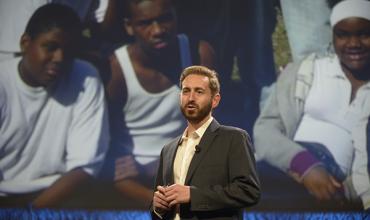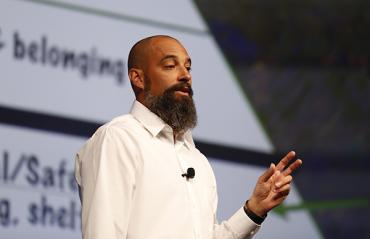We already know intuitively that a child's learning begins with trust, and that often, trust first requires healing. Two experts on that process—one on why, and the other on how—spoke with educators during a July 20 TEACH session on children's well-being.
Michael Lamb, a former teacher and executive director of Turnaround for Children in Washington, D.C., offered a primer on brain function, while Jeff Duncan-Andrade, a teacher in Oakland, Calif., and an associate professor at San Francisco State University, discussed reversing childhood trauma.
Adversity doesn't just "happen" to children, said Lamb (pictured below). It affects their brains and bodies, causing trauma. He spoke of cortisol, a hormone that drives panic attacks, and described three parts of the brain: the amygdala for emotional regulation and reactivity; the hippocampus for learning and memory; and the prefrontal cortex, which regulates executive function, self-regulation and attention.
"Adverse childhood experiences," which are known as ACEs, are stressful or traumatic events that have been shown to be related to a child's future health, mental health, victimization and violent behavior. These include domestic violence and neglect, but more research is needed on racial violence, Lamb said. He pointed to a study conducted in Washington state finding that 80 percent of students had had one or more adverse experiences.
The good news, Lamb said, is that the brain is malleable. Every new experience creates new neural pathways, providing hope that childhood trauma can be eased. If a child knows and trusts an adult, the basis is formed for healing. "This is a fundamentally positive story," he said, advising participants to ask themselves: Will my actions today build trust or erode trust?
Admittedly, the task is daunting. Duncan-Andrade (pictured below), who has been teaching in Oakland for more than two decades, showed a murder map of the city, a place of poverty and violence that has seen 550 homicides in five years. The San Francisco Chronicle calls it "the plague." In his neighborhood, he said, "ACEs stack up real quick."
Amid this carnage, he said, it's important to reach out to students in their lives beyond the schoolhouse door. "When we're privileging the Common Core over children's humanity," he said, "we're a morally bankrupt society." It's also important that teachers lift up a counter-narrative to prevailing talk about failing schools, and help build political will for making the school a center of wellness in the community, with the understanding that educators can't do it alone.
Schools must commit to teaching students to love who they are, he added, because kids don't kill someone who looks like themselves unless they hate themselves.
"Be a hope dealer," he said. "Push hope into the veins of our young people."
After their talks, AFT President Randi Weingarten sat with Lamb and Duncan-Andrade for a question-and-answer session in which she asked members to tweet at them and support them at @JDuncanAndrade and @Turnaround.
Asked how to help all children feel like they fit in, Duncan-Andrade suggested looking for colleagues who create a microclimate of caring. "Inevitably, somebody in your building is already doing that," he said. "So ask them. … They have tremendous insight. This profession is so profoundly isolating, and we have to end the isolation. Every problem we face, somebody has found it and unlocked it."
For more insights from his teaching in Oakland, watch this video of an interview with Duncan-Andrade. And visit the website for his organization, Roses in Concrete.
When Lamb was asked how to engage colleagues in difficult conversations about race, trauma and healing, he said his main advice is to listen. Duncan-Andrade counseled educators to be prepared for a long process of building their communities' commitment to all children. "Are we down to getting really, really uncomfortable?" he asked. "Because the meaning is in the mess."
[Annette Licitra]


